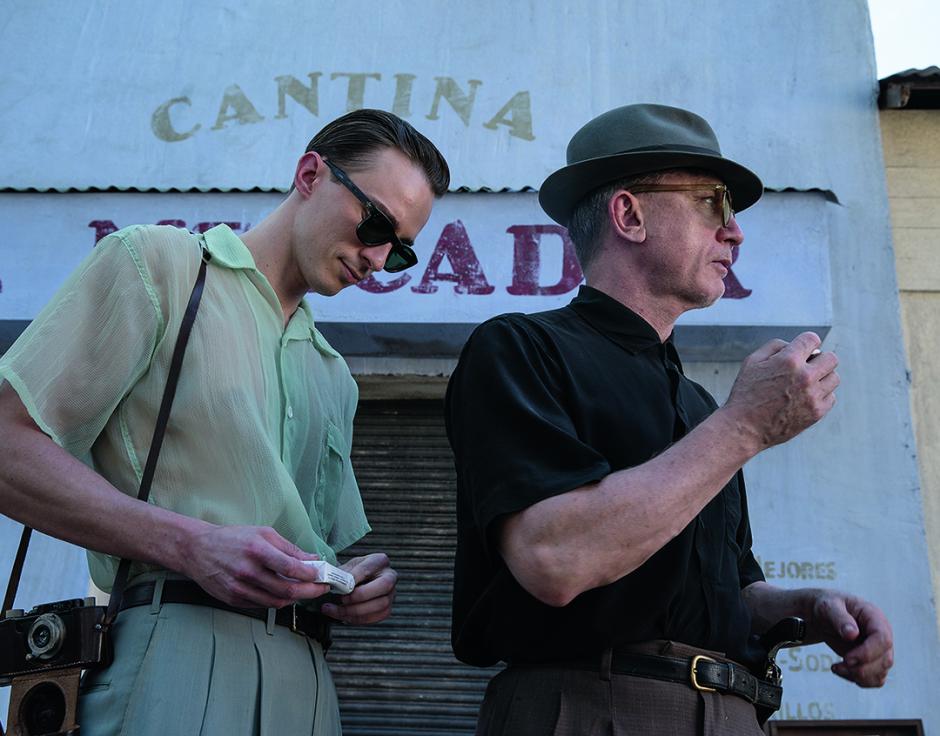“Vaster than empires”: Trent Reznor and Atticus Ross’s Queer score reviewed
February 2025

Empire of love: Drew Starkey and Daniel Craig in Queer (2024). Photo by Yannis Drakoulidis/Courtesy A24
In The Wire 493, Claire Biddles reviews Trent Reznor and Atticus Ross’s score for Luca Guadagnino’s film of William S Burroughs’s semi-autobiographical novel
Trent Reznor & Atticus Ross
Queer OST
Sony Soundtracks DL
In William S Burroughs’s final diary entry, dated two days before his death in 1997, the surrealist iconoclast recalls a friend referring to him as the saddest man in the world. “How can a man who sees and feels be other than sad,” he writes. In the same entry, his weariness is counteracted with a quote from the 17th century poem To His Coy Mistress by Andrew Marvell: “Our love will grow vaster than empires and more slow” – a seed of romantic hopefulness, dropped with great irony and pathos, from the past into the decaying present.
Both of these lines are extracted by Trent Reznor and Atticus Ross for “Vaster Than Empires”, the lead single from the Nine Inch Nails duo’s soundtrack to Queer, Luca Guadagnino’s heady, sharply felt adaptation of Burroughs’s 1950s novel of the same name. Sung with beautiful clarity by Reznor and legendary Brazilian singer Caetano Veloso, the lines overlap, entwine, soar and dip – two moods existing in strange harmony. In the film, the song plays over the credits, echoing the final moments of Burroughs’s semi-autobiographical character Lee – who, on the precipice of death, replays a brief moment of connection with the younger Allerton, with whom he shared a brief love affair, but maintained a lifetime of obsession. As has been the case throughout his life, Allerton – the presence, thought or memory of him – is the catalyst for a feeling of simultaneous longing, shame, desire and peace; a complicated but recognisable emotional cacophony that Guadagnino is an artistic expert in.
Reznor and Ross’s soundtrack for Queer – their third for Guadagnino, after the Americana of 2022’s Bones And All and the glittering techno of 2024’s Challengers – demonstrates a deep understanding of this contradictory state. Its tracks – their titles all quotes from Burroughs’s final diary entry – germinate from a handful of romantic, nostalgic melodic phrases, which are triggered onscreen by Allerton, sometimes musically at odds with their surroundings, sometimes meshing and melding with them – a palpable expression of Lee’s emotional surges, and the way that his feelings isolate him from reality.
Repeated melodic themes are a common tool in soundtrack music, but Reznor and Ross utilise them in a thematically appropriate and emotionally devastating way. Like the desperate Lee, the music is at the edge of oversentimentality, almost embarrassingly confessional. A lilting horn phrase saunters across the foreground, manageable and understandable. But on “Wouldn’t You?” it’s interrupted by chaotic outside sounds, struggling to co-exist. In “Real Enough” and “No Final Satori”, Reznor and Ross wrap their established phrases in tight casings, like shrinkwrapped or aspic-caught insects, both real and unreal.
On the second half of the album there are sporadic changes in mood, reflecting the shift in both the film and the original text from a naturalistic narrative to Burroughs’s more familiar surrealism. “Place Of Failure” is the most Nine Inch Nails flavoured moment, four minutes of propulsive industrial production and recognisably Reznor-esque melodic phrases that, in the film, marks Lee and Allerton’s brief relocation to South America. Their drug trip in the Ecuadorian jungle is signalled by the foreboding bass drums and saxophone skronk of “No Holy Grail” – a burst of manic energy that seems to be in conversation with Howard Shore and Ornette Coleman’s soundtrack to another Burroughs adaptation, David Cronenberg’s Naked Lunch. But even through this stylistic warping and switching, Allerton’s themes are still present, still hanging on – a heart’s anchor, like Lee’s half-imagined kinship with Allerton.
By the sombre final track “LOVE.” – the last word in Burroughs’s diary, the “most natural painkiller what there is” – Allerton’s theme has become celestial, absorbed into a cloud of static and trembling hums, circling and repeating into infinity. No longer heard, but still echoing somewhere – like the memory of a body against yours, remembered for years, written into a novel as fictional characters, played in a film by two actors, interpreted in accompanying song. Vaster than empires.
This review appears in The Wire 493 along with many other reviews of new and recent records, books, films, festivals and more. To read them all, pick up a copy of the magazine in our online shop. Wire subscribers can also read the issue in our online magazine library.
Leave a comment